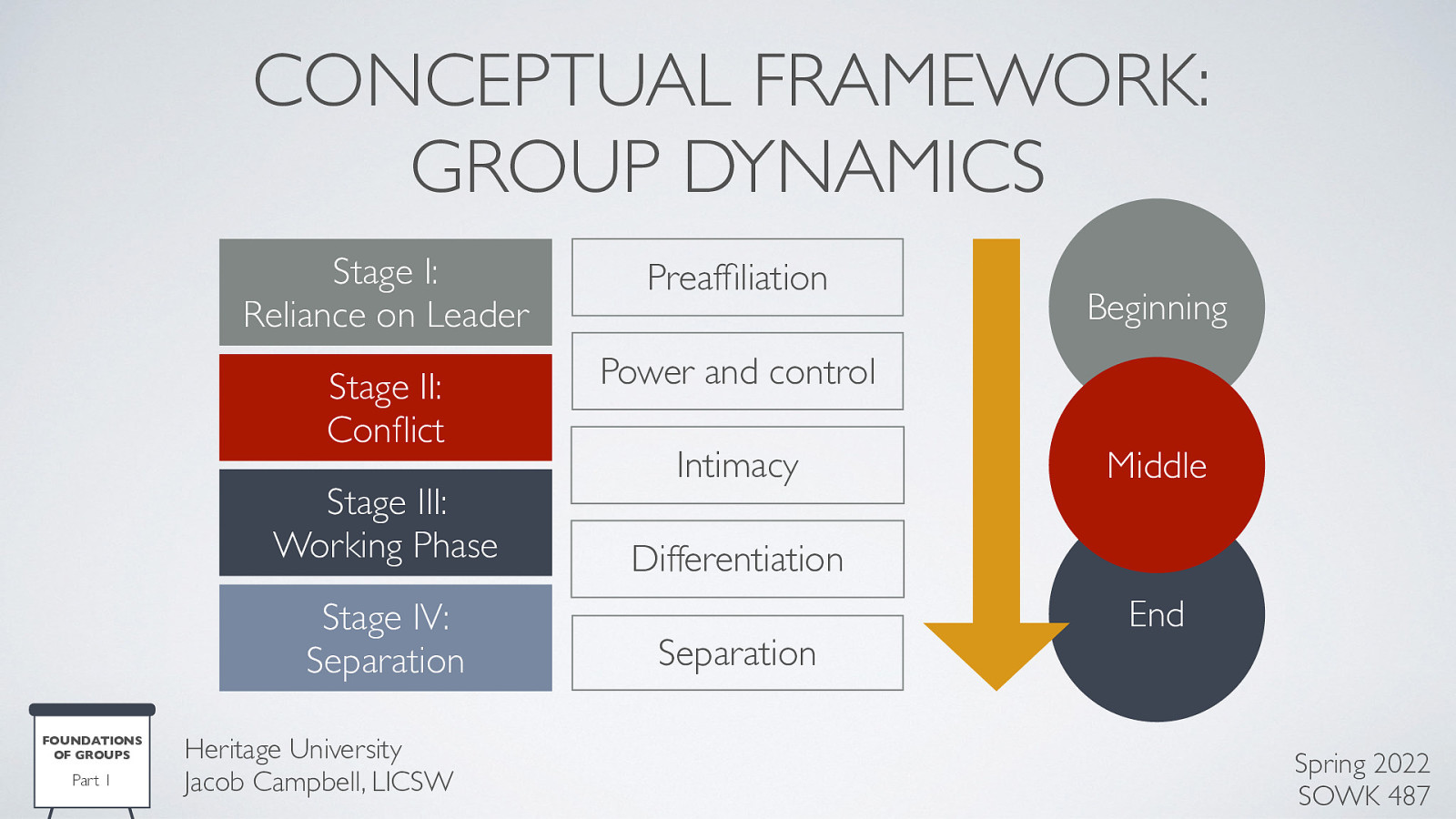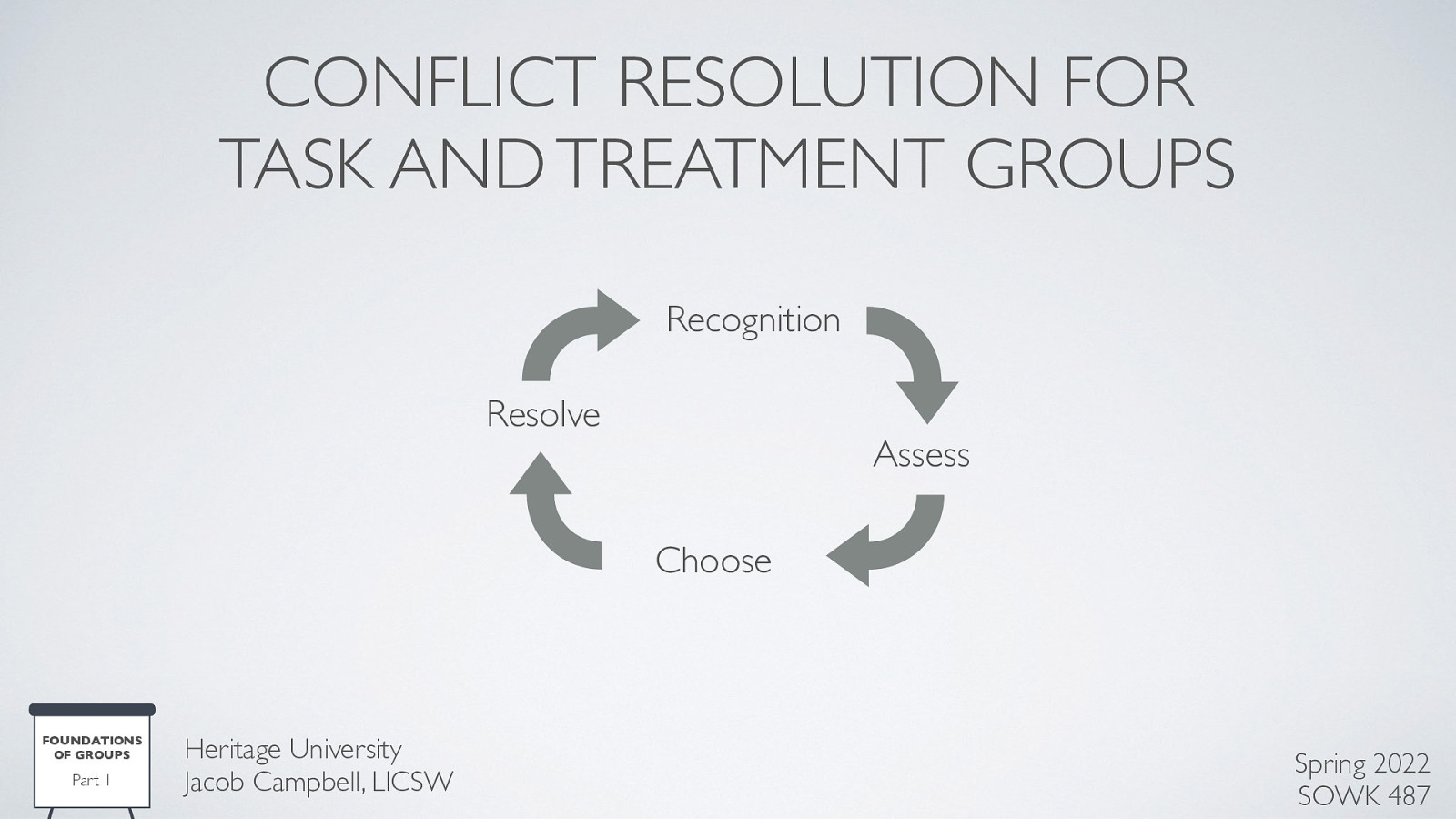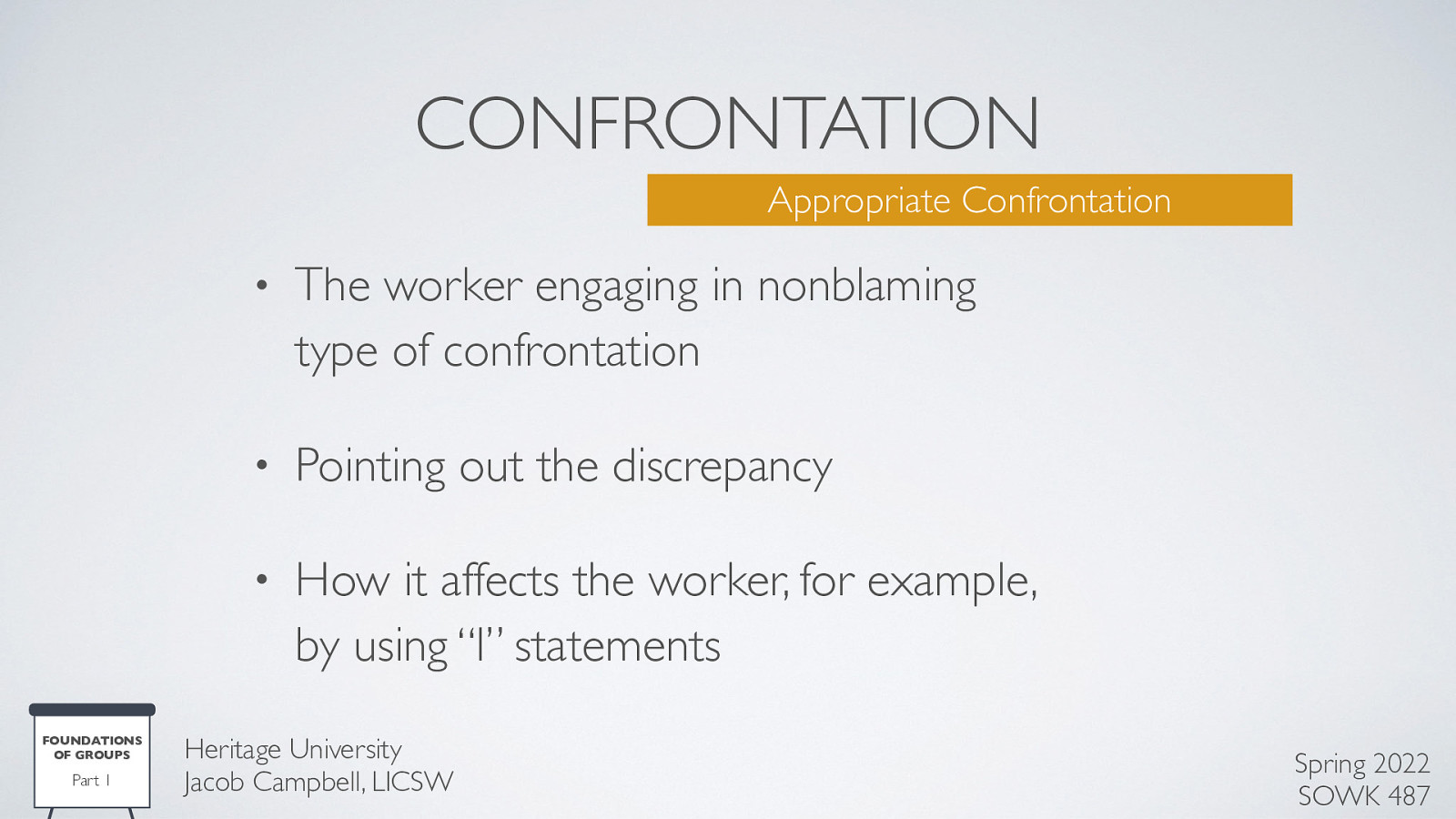Theoretical and Philosophical Heritage University Jacob Campbell, MSW SOWK 487 Theories of Practice II FOUNDATIONS OF GROUPS Part 1
Slide 1

Slide 2

If you were to describe your day today as an animal, what animal would you it it be today and why?
Slide 3

SOCIAL WORK & GROUPS What are groups used for in social work practice? FOUNDATIONS OF GROUPS Part 1 Heritage University Jacob Campbell, LICSW Spring 2022 SOWK 487
Slide 4

AGENDA FOUNDATIONS OF GROUPS Part 1 • Overview of working with groups • Group dynamics and roles • Tools and strategies in groups Heritage University Jacob Campbell, LICSW Spring 2022 SOWK 487
Slide 5

WORKING WITH GROUPS Groups? A group is a collection of people with shared interests who come together to pursue a goal FOUNDATIONS OF GROUPS Part 1 Heritage University Jacob Campbell, LICSW Spring 2022 SOWK 487
Slide 6

“Nothing truly valuable can be achieved except by the unsel sh cooperation of many individuals.” –Albert Einstein Mutual assistance Connecting with others Testing new behaviors Goal achievement Decision making FOUNDATIONS OF GROUPS fi Part 1 Heritage University Jacob Campbell, LICSW Spring 2022 SOWK 487
Slide 7

TYPES OF GROUPS Treatment Groups Growth Group Therapy Groups Educational Groups Socialization Group Support Groups FOUNDATIONS OF GROUPS Part 1 Heritage University Jacob Campbell, LICSW Spring 2022 SOWK 487
Slide 8

TYPES OF GROUPS Treatment Groups Growth Group Therapy Groups Educational Groups Socialization Group Support Groups FOUNDATIONS OF GROUPS Part 1 Heritage University Jacob Campbell, LICSW Task Groups Community Organization Client Spring 2022 SOWK 487
Slide 9

TYPES OF GROUPS FOUNDATIONS OF GROUPS Part 1 Treatment Groups Task Groups Growth Group Therapy Groups Educational Groups Socialization Group Support Groups Board of Directors Task Forces Committees Commissions Legislative Bodies Staff Meetings Case Conferences Social Action Heritage University Jacob Campbell, LICSW Spring 2022 SOWK 487
Slide 10

PROFESSIONAL ROLES IN GROUPS FOUNDATIONS OF GROUPS Part 1 Broker Group Mediator Educator Multiple Roles Facilitator Heritage University Jacob Campbell, LICSW Spring 2022 SOWK 487
Slide 11

GROUP FUNCTIONS & ROLES Potentially Positive Roles Information seeker Opinion seeker Elaborator Instructor Evaluator Energizer Recorder FOUNDATIONS OF GROUPS Part 1 Heritage University Jacob Campbell, LICSW Task Functions Maintenance Functions Procedural technician Harmonizer Compromiser Encourager Follower Tension reliever Listener Spring 2022 SOWK 487
Slide 12

NEGATIVE AND NONFUNCTIONAL ROLES FOUNDATIONS OF GROUPS Part 1 Potentially Negative Roles Nonfunctional Roles Aggressor Blocker Recognition seeker Dominator Help seeker Confessor Scapegoat Defensive member Deviant member Quite member Internal leader Heritage University Jacob Campbell, LICSW Spring 2022 SOWK 487
Slide 13

GROUP DEMO Jacob’s Group Format • Review the rules • Check in question • Fun engaging activity • Work on a speci c topic or skill Part 1 Heritage University Jacob Campbell, LICSW fi FOUNDATIONS OF GROUPS Spring 2022 SOWK 487
Slide 14

ADAPTED ONLINE CIRCLE Following at Restorative Justice Model Respect the talking piece: everyone listens, everyone has a turn Speak from the heart: your truth, your perspectives, your experiences Listen from the heart: Let go of stories that make it hard to hear each other Trust that you know what to say: no need to rehearse: no need to rehearse Say just enough: without feeling rushed, be concise and considerate of the time of others FOUNDATIONS OF GROUPS Part 1 Heritage University Jacob Campbell, LICSW (Clifford, 2013) Spring 2022 SOWK 487
Slide 15

What have been some dif cult aspects of college so far and how have you managed? If you could have given yourself a piece of advice your rst year of college, what would it have been? How do you study, and what do you do when you study? FOUNDATIONS OF GROUPS Part 1 fi fi STUDYING AND COLLEGE LIFE Heritage University Jacob Campbell, LICSW Spring 2022 SOWK 487
Slide 16

ASSESSING INDIVIDUALS’ PATTERNED BEHAVIORS Content FOUNDATIONS OF GROUPS Part 1 Heritage University Jacob Campbell, LICSW Process Thematic Behaviors Spring 2022 SOWK 487
Slide 17

GROUP DYNAMICS AND COMPOSITION Climate Norms Group Culture FOUNDATIONS OF GROUPS Part 1 Heritage University Jacob Campbell, LICSW Values Power Group Size Composition — Age — Gender — Homogeneity Spring 2022 SOWK 487
Slide 18

Persuasion by Minority Compromise By Majority Rule by Individual FOUNDATIONS OF GROUPS Part 1 Heritage University Jacob Campbell, LICSW Parliamentary procedure DECISION MAKING PATTERNS Consensus Brainstorming Nominal Group Averaging of Opinions Persuasion by Expert Spring 2022 SOWK 487
Slide 19

CRITICAL THINKING AND GROUPS Critical Thinking Heterogeneity FOUNDATIONS OF GROUPS Part 1 Heritage University Jacob Campbell, LICSW Spring 2022 SOWK 487
Slide 20

CONCEPTUAL FRAMEWORK: GROUP DYNAMICS Stage I: Reliance on Leader Preaf liation Stage II: Con ict Power and control Stage III: Working Phase Stage IV: Separation FOUNDATIONS OF GROUPS fi fl Part 1 Heritage University Jacob Campbell, LICSW Intimacy Beginning Middle Differentiation Separation End Spring 2022 SOWK 487
Slide 21

CONFLICT RESOLUTION FOR TASK AND TREATMENT GROUPS Recognition Resolve Assess Choose FOUNDATIONS OF GROUPS Part 1 Heritage University Jacob Campbell, LICSW Spring 2022 SOWK 487
Slide 22

MODELING AND COACHING Modeling FOUNDATIONS OF GROUPS Part 1 Heritage University Jacob Campbell, LICSW Evoking Behavior Change Coaching Spring 2022 SOWK 487
Slide 23

CONFRONTATION Appropriate Confrontation FOUNDATIONS OF GROUPS Part 1 • The worker engaging in nonblaming type of confrontation • Pointing out the discrepancy • How it affects the worker, for example, by using “I” statements Heritage University Jacob Campbell, LICSW Spring 2022 SOWK 487